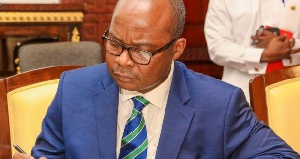 Bank of Ghana Governor, Ernest Addison
Bank of Ghana Governor, Ernest Addison
The Bank of Ghana has intensified its monitoring and supervision of all banking transactions in the country to the extent of establishing offices in some of the banks - a move seen by many as necessary to prevent any unforeseen misfortune in the sector.
Since the takeover of Capital and UT Bank by GCB in August, the BoG has not hidden its intention of cracking the whip on banks that fail to adhere to banking rules and regulations.
Forex, investments and placements, trade and asset financing or loans are the major transactions that the Central Bank has been vigorously observing and scrutinizing to instil soundness and disciplined in the Ghanaian banking industry, a key catalyst for economic development.
Business Finder gathers that the Governor of the Bank of Ghana, Dr. Ernest Addison is not amused with the laxity of the supervision department which has led to some banks being an unpleasant state, requiring the regulator’s support occasionally.
The paper further learnt that the treasury, trade finance and credit risk departments of all universal banks submit daily transactions of their activities to the regulator.
The BoG had warned that any bank that operates in contrary to its rules and regulations will receive hefty sanctions.
Media reports have revealed that the Central Bank might be forced to take over the day-to-day running of certain commercial banks that are facing difficulties. Prior to its takeover by GCB Bank, UT Bank had a BOG office in its corporate head office supervising the day-to-day banking activities.
The International Monetary Fund (IMF) has also been pushing the Finance Ministry and the Bank of Ghana to takeover operations of some banks which it described have been struggling and occasionally requires ‘live support’.
Meanwhile, information reaching this paper indicates that some banks, at least two (name withheld), have indicated to the Central Bank of running as savings and loans if they fail to meet the new minimum capital requirement.
The banks are said to be indigenous ones that are considering many options including operating as second tier banks.
Their presence in the second-tier sector could also compel the Central Bank to adjust the minimum capital requirement up from the current GHc15 million. Per the new directive by the Bank of Ghana, banks that fail to meet the GHc400 million stated capital by December 2017 will be compelled to be taken over by their counterparts or revert to savings and loans.
Banks have up until December 2017 to indicate their plans of shoring up their stated capital to GHc400 million by the end of next year.
Presently, there are 34 banks operating in the country. They include The Beige and GHL.
At the end of July 2017, total asset base of banks increased to GH¢89.1 billion, representing an annual growth of 32.9 percent compared to 24.6 percent growth a year earlier. The growth in assets was funded largely by domestic deposits which went up by 32 percent on a year-on-year basis.
The industry’s Capital Adequacy Ratio, however, averaged 14.3 percent at the end of August 2017, above the 10.0 percent statutory threshold.